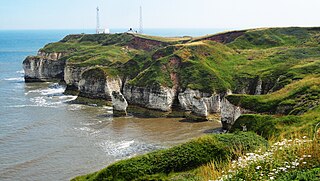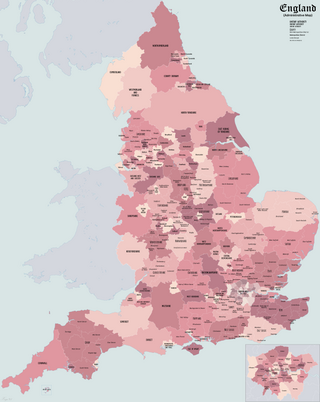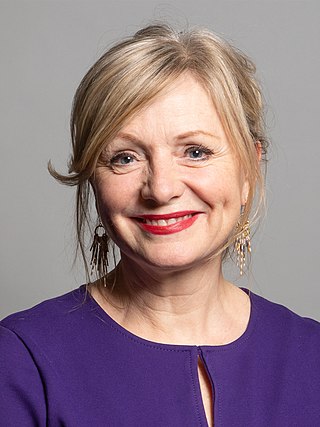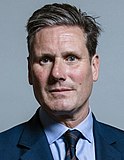
The East Riding of Yorkshire, often abbreviated to the East Riding or East Yorkshire, is a ceremonial county in the Yorkshire and the Humber region of England. It borders North Yorkshire to the north and west, South Yorkshire to the south-west, and Lincolnshire to the south across the Humber Estuary. The city of Kingston upon Hull is the largest settlement.

The subdivisions of England constitute a hierarchy of administrative divisions and non-administrative ceremonial areas.

Local government in England broadly consists of three layers: civil parishes, local authorities, and regional authorities. Every part of England is governed by at least one local authority, but parish councils and regional authorities do not exist everywhere. In addition, there are 31 police and crime commissioners, four police, fire and crime commissioners, and ten national park authorities with local government responsibilities. Local government is not standardised across the country, with the last comprehensive reform taking place in 1974.

The North East England devolution referendum was an all postal ballot referendum that took place on 4 November 2004 throughout North East England on whether or not to establish an elected assembly for the region. Devolution referendums in the regions of Northern England were initially proposed under provisions of the Regional Assemblies (Preparations) Act 2003. Initially, three referendums were planned, but only one took place. The votes concerned the question of devolving limited political powers from the UK Parliament to elected regional assemblies in North East England, North West England and Yorkshire and the Humber respectively. Each were initially planned to be held on 4 November 2004, but on 22 July 2004 the planned referendums in North West England and in Yorkshire and the Humber were postponed, due to concerns raised about the use of postal ballots, but the referendum in North East England was allowed to continue, particularly as it was assumed that the region held the most support for the proposed devolution.

Local authority areas in England typically have an executive leader and a cabinet selected from the local council, similar to how the national prime minister and cabinet are selected from Parliament. In contrast, residents of some areas, or groups of areas known as combined authorities or combined county authorities, directly elect the executive mayors of their local government.
The history of local government in Yorkshire is unique and complex. Yorkshire is the largest historic English county and consists of a diverse mix of urban and rural development with a heritage in agriculture, manufacturing, and mining. After a long period with little change, it has been subject to a number of reforms of local government structures in modern times, some of which were controversial. The most significant of these were the Local Government Act 1972, the 1990s UK local government reform, and the Localism Act 2011. The historic area currently corresponds to several counties and districts and is mostly contained within the Yorkshire and the Humber region.

A combined authority (CA) is a type of local government institution introduced in England outside Greater London by the Local Democracy, Economic Development and Construction Act 2009. CAs are created voluntarily and allow a group of local authorities to pool appropriate responsibility and receive certain devolved functions from central government in order to deliver transport and economic policy more effectively over a wider area. In areas where local government is two-tier, both must participate in the combined authority.

North Lincolnshire Council is the local authority of North Lincolnshire, England. It is a unitary authority, having the powers of a county council and district council combined. It provides a full range of local government services including Council Tax billing, libraries, social services, town planning, and waste collection and disposal. It is also a local education authority. The council is based in Scunthorpe.

In the United Kingdom, devolution is the Parliament of the United Kingdom's statutory granting of a greater level of self-government to the Scottish Parliament, the Senedd, the Northern Ireland Assembly and the London Assembly and to their associated executive bodies: the Scottish Government, the Welsh Government, the Northern Ireland Executive and in England, the Greater London Authority and combined authorities.

The Cities and Local Government Devolution Act 2016 is an Act of the Parliament of the United Kingdom that allows for the introduction of directly elected mayors to combined authorities in England and Wales and the devolution of housing, transport, planning and policing powers to them. The bill was introduced to the House of Lords by Baroness Williams of Trafford, the Parliamentary Under Secretary of State for Communities and Local Government, on 28 May 2015.

The 2017 United Kingdom local elections were held on Thursday 4 May 2017. Local elections were held across Great Britain, with elections to 35 English local authorities and all councils in Scotland and Wales.

The 2021 United Kingdom local elections were held on Thursday 6 May 2021. More than 145 English local councils, around 5,000 councillor seats, thirteen directly elected mayors in England, and 39 police and crime commissioners in England and Wales were contested. On the same day, the 2021 Hartlepool by-election took place, and there were also elections to the Scottish Parliament, Senedd and London Assembly, the last in conjunction with the London mayoral election.
Structural changes to local government in England took place between 2019 and 2023. Some of these changes continue the trend of new unitary authorities being created from other types of local government districts, which was a policy of Communities Secretary Robert Jenrick from 2019.

The Mayor of West Yorkshire is a directly elected mayor responsible for the metropolitan county of West Yorkshire in England. The Mayor chairs and leads the West Yorkshire Combined Authority, and assumes the office and powers of the West Yorkshire Police and Crime Commissioner.

The inaugural West Yorkshire mayoral election was held on Thursday 6 May 2021 to elect the Mayor of West Yorkshire. It took place simultaneously on the same day as other local elections across the United Kingdom, including council elections in each of the five metropolitan boroughs of West Yorkshire.

Northern England devolution is the broad term used to describe the wish for devolved governmental powers that would give more autonomy to the Northern Counties.

The 2022 United Kingdom local elections took place on Thursday 5 May 2022. These included elections for all London borough councils, for all local authorities in Wales and Scotland. Most seats in England were last up for election in 2018 and in Scotland and Wales in 2017. The elections coincided with the 2022 Northern Ireland Assembly election. In 91 cases, most of them in Wales, council seats were uncontested, each having only one candidate. Three seats in Scotland remained unfilled as no one nominated to fill them.

The Mayor of York and North Yorkshire is the mayor of the York and North Yorkshire Combined Authority covering the City of York and North Yorkshire unitary authority areas and was elected for the first time in May 2024.
The Greater Lincolnshire Combined County Authority (GLCCA) is the proposed combined county authority for the county of Lincolnshire, for the local authority areas of Lincolnshire, North Lincolnshire and North East Lincolnshire in the East Midlands and Yorkshire and Humber regions of England. The first election for the Mayor of Greater Lincolnshire, who will chair GLCCA, is expected to take place in May 2025.
The Hull and East Yorkshire Mayoral Combined Authority (HEYMCA) is the proposed combined authority for the city of Hull and county of East Yorkshire, in the Yorkshire and the Humber region of England. The first election for the Mayor of Hull and East Yorkshire, who will chair HEYMCA, is expected to take place in May 2025.



















